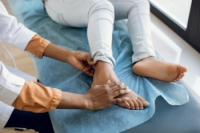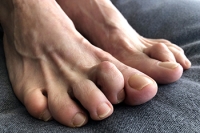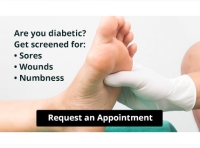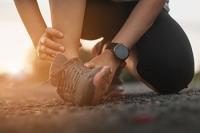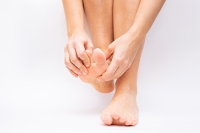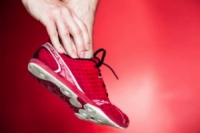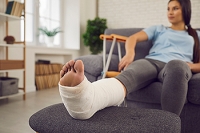
Blog (807)
Diagnosing a Lisfranc Fracture
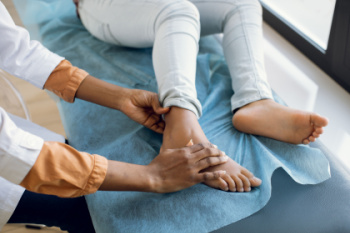
Lisfranc fractures, occurring deep within the midfoot, present a diagnostic challenge due to their intricate location amidst a multitude of bones and tendons. Often misdiagnosed, these fractures result from either broken bones or torn ligaments supporting the midfoot structure. A Lisfranc fracture can range from mild muscle tears to complex fractures that involve multiple bones and joints. Lisfranc fractures are commonly mistaken for a simple foot sprain and can lead to prolonged pain and complications if left untreated. Low-energy incidents, like missteps or falls during routine activities, typically cause these fractures. High-energy traumas from elevated falls also can result in this type of injury. An accurate diagnosis of a Lisfranc fracture is challenging and requires a thorough evaluation by a podiatrist, using advanced imaging techniques. Proper treatment of Lisfranc fractures, ranging from conservative measures to surgical intervention, is essential for optimal recovery, as ignoring the injury or attempting to walk it off can worsen damage and prolong healing time. If you are experiencing severe pain in the midfoot area, it is suggested that you schedule an appointment with a podiatrist as quickly as possible for a complete exam and diagnosis.
A broken foot requires immediate medical attention and treatment. If you need your feet checked, contact Dr. Kenneth Donovan from Advanced Care Foot and Ankle. Our doctor can provide the care you need to keep you pain-free and on your feet.
Broken Foot Causes, Symptoms, and Treatment
A broken foot is caused by one of the bones in the foot typically breaking when bended, crushed, or stretched beyond its natural capabilities. Usually the location of the fracture indicates how the break occurred, whether it was through an object, fall, or any other type of injury.
Common Symptoms of Broken Feet:
- Bruising
- Pain
- Redness
- Swelling
- Blue in color
- Numbness
- Cold
- Misshapen
- Cuts
- Deformities
Those that suspect they have a broken foot shoot seek urgent medical attention where a medical professional could diagnose the severity.
Treatment for broken bones varies depending on the cause, severity and location. Some will require the use of splints, casts or crutches while others could even involve surgery to repair the broken bones. Personal care includes the use of ice and keeping the foot stabilized and elevated.
If you have any questions please feel free to contact one of our offices located in Warren, Livingston, and Toms River, NJ . We offer the newest diagnostic and treatment technologies for all your foot and ankle needs.
Definition and Causes of Hammertoe
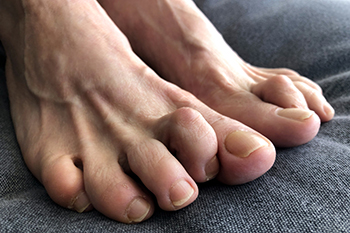
Hammertoe, a common foot ailment, unfolds as a deformity characterized by an abnormal bending of the toe joints. The condition primarily affects the second, third, or fourth toe, causing it to resemble a hammer's curved shape. One of the key causes of hammertoe is an imbalance in the muscles and tendons that control toe movement, leading to joint misalignment. Wearing ill-fitting shoes with narrow or high toe boxes can exacerbate the problem, cramping the toes and impeding their natural movement. Additionally, genetic predisposition and certain medical conditions, such as arthritis or diabetes, may increase susceptibility to developing hammertoe. Understanding the definition and underlying causes of hammer toe is essential for early intervention. If you have developed hammertoe, it is suggested that you visit a podiatrist who can guide you toward successful treatment and prevention methods.
Hammertoe
Hammertoes can be a painful condition to live with. For more information, contact Dr. Kenneth Donovan from Advanced Care Foot and Ankle. Our doctor will answer any of your foot- and ankle-related questions.
Hammertoe is a foot deformity that affects the joints of the second, third, fourth, or fifth toes of your feet. It is a painful foot condition in which these toes curl and arch up, which can often lead to pain when wearing footwear.
Symptoms
- Pain in the affected toes
- Development of corns or calluses due to friction
- Inflammation
- Redness
- Contracture of the toes
Causes
Genetics – People who are genetically predisposed to hammertoe are often more susceptible
Arthritis – Because arthritis affects the joints in your toes, further deformities stemming from arthritis can occur
Trauma – Direct trauma to the toes could potentially lead to hammertoe
Ill-fitting shoes – Undue pressure on the front of the toes from ill-fitting shoes can potentially lead to the development of hammertoe
Treatment
Orthotics – Custom made inserts can be used to help relieve pressure placed on the toes and therefore relieve some of the pain associated with it
Medications – Oral medications such as anti-inflammatories or NSAIDs could be used to treat the pain and inflammation hammertoes causes. Injections of corticosteroids are also sometimes used
Surgery – In more severe cases where the hammertoes have become more rigid, foot surgery is a potential option
If you have any questions please contact one of our offices located in Warren, Livingston, and Toms River, NJ . We offer the newest diagnostic and treatment technologies for all your foot and ankle needs.
Wounds That Don't Heal Need to Be Checked
The Allure of High Heels and How The Feet Are Affected
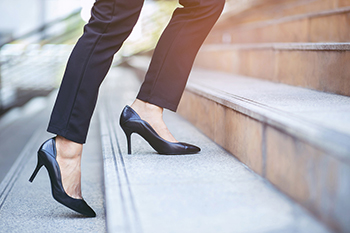
In the world of fashion, high heels have long been a symbol of elegance and femininity. Women don these stylish shoes to exude confidence and sophistication, often enhancing their overall appearance. The elevated stature achieved by wearing high heels can create a sense of empowerment, both physically and mentally. However, this fashion choice comes with a price, impacting the feet in various ways. The arching of the foot, a characteristic of high heels, can lead to strain on the calf muscles and alter the body's natural alignment. In addition, prolonged wear may contribute to foot pain, bunions, and other podiatric issues. Despite the potential risks, many women continue to embrace high heels as a form of self-expression. A podiatrist can further explain how wearing high heels can affect the feet. If you have foot, toe, or ankle pain as the result of wearing high heels, it is suggested that you visit this type of doctor for an exam and treatment.
High heels have a history of causing foot and ankle problems. If you have any concerns about your feet or ankles, contact Dr. Kenneth Donovan from Advanced Care Foot and Ankle. Our doctor can provide the care you need to keep you pain-free and on your feet.
Effects of High Heels on the Feet
High heels are popular shoes among women because of their many styles and societal appeal. Despite this, high heels can still cause many health problems if worn too frequently.
Which Parts of My Body Will Be Affected by High Heels?
- Ankle Joints
- Achilles Tendon – May shorten and stiffen with prolonged wear
- Balls of the Feet
- Knees – Heels cause the knees to bend constantly, creating stress on them
- Back – They decrease the spine’s ability to absorb shock, which may lead to back pain. The vertebrae of the lower back may compress.
What Kinds of Foot Problems Can Develop from Wearing High Heels?
- Corns
- Calluses
- Hammertoe
- Bunions
- Morton’s Neuroma
- Plantar Fasciitis
How Can I Still Wear High Heels and Maintain Foot Health?
If you want to wear high heeled shoes, make sure that you are not wearing them every day, as this will help prevent long term physical problems. Try wearing thicker heels as opposed to stilettos to distribute weight more evenly across the feet. Always make sure you are wearing the proper shoes for the right occasion, such as sneakers for exercising. If you walk to work, try carrying your heels with you and changing into them once you arrive at work. Adding inserts to your heels can help cushion your feet and absorb shock. Full foot inserts or metatarsal pads are available.
If you have any questions please feel free to contact one of our offices located in Warren, Livingston, and Toms River, NJ . We offer the newest diagnostic and treatment technologies for all your foot and ankle needs.
Ankle Sprains From Running
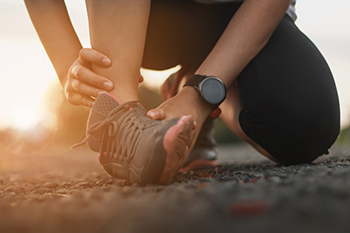
For runners, ankle sprains can be a frustrating setback, but understanding the nature of the injury is key to effective recovery. Ankle sprains are classified into three grades, with grades 1 and 2 involving varying degrees of ligament overstretching or partial tearing, while grade 3 signifies a complete tear. The most common type is the lateral or inversion sprain, occurring when the foot rolls outward, injuring the outer ligament that connects the ankle bone to the calf bone. In contrast, the rarer medial ligament sprain happens when the foot rolls inward, affecting ligaments on the inner side of the ankle. Runners may also face the challenge of high ankle sprains, which occur above the ankle in the lower leg. This type of sprain results from a downward pointing and twisting motion. This causes a stretch of the syndesmotic ligaments that connect the tibia and fibula in the lower leg to the top of the foot. It is essential that runners do not ignore such injuries, as failing to heal from an ankle sprain completely can cause chronic weak ankles. For an exam, diagnosis, and treatment options, it is suggested that you schedule an appointment with a podiatrist as quickly as possible after being injured.
Sports related foot and ankle injuries require proper treatment before players can go back to their regular routines. For more information, contact Dr. Kenneth Donovan of Advanced Care Foot and Ankle. Our doctor can provide the care you need to keep you pain-free and on your feet.
Sports Related Foot and Ankle Injuries
Foot and ankle injuries are a common occurrence when it comes to athletes of any sport. While many athletes dismiss the initial aches and pains, the truth is that ignoring potential foot and ankle injuries can lead to serious problems. As athletes continue to place pressure and strain the area further, a mild injury can turn into something as serious as a rupture and may lead to a permanent disability. There are many factors that contribute to sports related foot and ankle injuries, which include failure to warm up properly, not providing support or wearing bad footwear. Common injuries and conditions athletes face, including:
- Plantar Fasciitis
- Plantar Fasciosis
- Achilles Tendinitis
- Achilles Tendon Rupture
- Ankle Sprains
Sports related injuries are commonly treated using the RICE method. This includes rest, applying ice to the injured area, compression and elevating the ankle. More serious sprains and injuries may require surgery, which could include arthroscopic and reconstructive surgery. Rehabilitation and therapy may also be required in order to get any recovering athlete to become fully functional again. Any unusual aches and pains an athlete sustains must be evaluated by a licensed, reputable medical professional.
If you have any questions please feel free to contact one of our offices located in Warren, Livingston, and Toms River, NJ . We offer the newest diagnostic and treatment technologies for all your foot and ankle needs.
Distinguishing Turf Toe From Gout
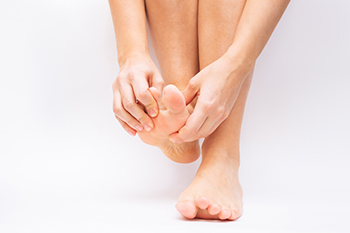
Turf toe and gout, although both affecting the feet, originate from distinct causes and exhibit different symptoms. Turf toe, often associated with athletes and individuals engaging in activities that involve repetitive pushing off the toe, is essentially a sprain of the ligaments surrounding the big toe joint. It manifests as pain, swelling, and limited range of motion. Conversely, gout is a form of inflammatory arthritis resulting from the crystallization of uric acid in the joints, frequently the big toe. Gout attacks bring intense pain, swelling, and redness. While turf toe stems from mechanical stress, gout is closely linked to diet and metabolic factors. Understanding these disparities is pivotal for accurate diagnosis and tailored treatment. If you have toe pain, it is suggested that you consult a podiatrist who can diagnose and treat turf toe and gout.
Toe pain can disrupt your daily activities. If you have any concerns, contact Dr. Kenneth Donovan of Advanced Care Foot and Ankle. Our doctor can provide the care you need to keep you pain-free and on your feet.
What Causes Toe Pain?
Most severe toe pain is caused due to a sports injury, trauma from dropping something heavy on the toe, or bumping into something rigid. Other problems can develop over time for various reasons.
Toe pain can be caused by one or more ailments. The most common include:
- Trauma
- Sports injury
- Wearing shoes that are too tight
- Arthritis
- Gout
- Corns and calluses
- Hammertoe
- Bunions
- Blisters
- Ingrown toenails
- Sprains
- Fractures (broken bones)
- Dislocations
When to See a Podiatrist
- Severe pain
- Persistent pain that lasts more than a week
- Signs of infection
- Continued swelling
- Pain that prevents walking
Diagnosis
In many cases the cause of toe pain is obvious, but in others, a podiatrist may want to use more advanced methods to determine the problem. These can range from simple visual inspections and sensation tests to X-rays and MRI scans. Prior medical history, family medical history, and any recent physical traumatic events will all be taken into consideration for a proper diagnosis.
Treatment
Treatments for toe pain and injuries vary and may include shoe inserts, padding, taping, medicines, injections, and in some cases, surgery. If you believe that you have broken a toe, please see a podiatrist as soon as possible.
If you have any questions please feel free to contact one of our offices located in Warren, Livingston, and Toms River, NJ . We offer the newest diagnostic tools and technology to treat your foot and ankle needs.
It's Time for Beautiful Feet
Dietary Guidelines for Gout Management

Gout, a form of arthritis caused by the accumulation of uric acid crystals in the joints, often the big toe, requires careful attention to dietary choices to manage symptoms effectively. A key principle is moderating the intake of purine rich foods, as purines contribute to elevated uric acid levels. Reducing the consumption of organ meats, seafood, and certain legumes can help mitigate the risk of gout attacks. Adequate hydration is essential, as it supports the elimination of uric acid through urine. Incorporating low fat dairy products, which have been associated with a lower risk of gout, can be beneficial. Additionally, maintaining a healthy weight is vital, as excess weight can contribute to higher uric acid levels. Fruits, vegetables, and whole grains are encouraged, as they provide essential nutrients without significantly impacting uric acid levels. If you have developed gout, it is strongly suggested that you are under the care of a podiatrist who can effectively treat this condition, and guide you toward healthy food choices.
Gout is a painful condition that can be treated. If you are seeking treatment, contact Dr. Kenneth Donovan from Advanced Care Foot and Ankle. Our doctor will treat your foot and ankle needs.
What Is Gout?
Gout is a form of arthritis that is characterized by sudden, severe attacks of pain, redness, and tenderness in the joints. The condition usually affects the joint at the base of the big toe. A gout attack can occur at any random time, such as the middle of the night while you are asleep.
Symptoms
- Intense Joint Pain - Usually around the large joint of your big toe, and it most severe within the first four to twelve hours
- Lingering Discomfort - Joint discomfort may last from a few days to a few weeks
- Inflammation and Redness -Affected joints may become swollen, tender, warm and red
- Limited Range of Motion - May experience a decrease in joint mobility
Risk Factors
- Genetics - If family members have gout, you’re more likely to have it
- Medications - Diuretic medications can raise uric acid levels
- Gender/Age - Gout is more common in men until the age of 60. It is believed that estrogen protects women until that point
- Diet - Eating red meat and shellfish increases your risk
- Alcohol - Having more than two alcoholic drinks per day increases your risk
- Obesity - Obese people are at a higher risk for gout
Prior to visiting your podiatrist to receive treatment for gout, there are a few things you should do beforehand. If you have gout you should write down your symptoms--including when they started and how often you experience them, important medical information you may have, and any questions you may have. Writing down these three things will help your podiatrist in assessing your specific situation so that he or she may provide the best route of treatment for you.
If you have any questions, please feel free to contact one of our offices located in Warren, Livingston, and Toms River, NJ . We offer the newest diagnostic and treatment technologies for all your foot care needs.
Ankle and Heel Injuries From Running
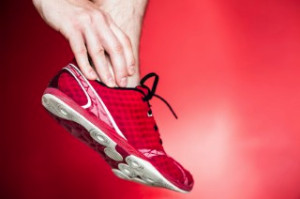
Runners, whether seasoned athletes or casual enthusiasts, face potential risks of three main types of foot and ankle injuries. Among these common ailments are Achilles tendonitis, heel bursitis and sprained ankles. Achilles tendonitis often results from overtraining or tight calf muscles. The Achilles tendon, which connects the calf muscles to the heel bone, can become inflamed, which limits the ankle's range of motion. Heel, or retrocalcaneal bursitis, is often mistaken for Achilles tendonitis because it also causes pain, tenderness, and swelling at the back of the heel. In fact, it is the result of inflammation of the fluid-filled sac between the heel bone and the Achilles tendon, and can result from excessive walking, jumping, or running, especially uphill. Runners must also be cautious of traumatic incidents like ankle sprains. Unlike overuse injuries, ankle sprains occur suddenly and involve the stretching or tearing of ligaments connecting ankle bones. The immediate pain and swelling, coupled with difficulty bearing weight on the affected foot, distinguish an ankle sprain from other injuries. If symptoms from any of these injuries persist or worsen, it is suggested that you schedule an appointment with a podiatrist for an accurate diagnosis and effective treatment plan.
All runners should take extra precaution when trying to avoid injury. If you have any concerns about your feet, contact Dr. Kenneth Donovan of Advanced Care Foot and Ankle. Our doctor will treat your foot and ankle needs.
How to Prevent Running Injuries
There are a lot of mistakes a runner can make prior to a workout that can induce injury. A lot of athletes tend to overstretch before running, instead of saving those workouts for a post-run routine. Deep lunges and hand-to-toe hamstring pulls should be performed after a workout instead of during a warmup. Another common mistake is jumping into an intense routine before your body is physically prepared for it. You should try to ease your way into long-distance running instead of forcing yourself to rush into it.
More Tips for Preventing Injury
- Incorporate Strength Training into Workouts - This will help improve the body’s overall athleticism
- Improve and Maintain Your Flexibility – Stretching everyday will help improve overall performance
- “Warm Up” Before Running and “Cool Down” Afterward – A warm up of 5-10 minutes helps get rid of lactic acid in the muscles and prevents delayed muscle soreness
- Cross-Training is Crucial
- Wear Proper Running Shoes
- Have a Formal Gait Analysis – Poor biomechanics can easily cause injury
If you have any questions, please feel free to contact one of our offices located in Warren, Livingston, and Toms River, NJ . We offer the newest diagnostic and treatment technologies for all your foot care needs.
The Danis-Weber Classification of Ankle Fractures
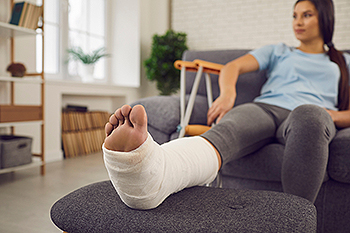
The Danis-Weber classification is a way to categorize ankle fractures based on X-rays. It helps podiatrists understand the type and location of the fracture. There are three types of fractures in this system. Type A is a lower ankle fracture below the joint. It is generally stable and may only need a cast or brace. Sometimes, surgery is necessary if the inner ankle is also damaged. Type B is a fracture that happens at the ankle joint level and moves upward along the outer bone. It can vary in stability. The inner ankle or ligaments may be affected. Type C fractures are fractures above the ankle joint and often involve the inner ligaments, which are unstable and typically require surgery. If you have sustained a broken ankle, it is strongly suggested that you schedule an appointment with a podiatrist for an imaging test and treatment based on which type of fracture is found.
Broken ankles need immediate treatment. If you are seeking treatment, contact Dr. Kenneth Donovan from Advanced Care Foot and Ankle. Our doctor can provide the care you need to keep you pain-free and on your feet.
Broken Ankles
A broken ankle is experienced when a person fractures their tibia or fibula in the lower leg and ankle area. Both of these bones are attached at the bottom of the leg and combine to form what we know to be our ankle.
When a physician is referring to a break of the ankle, he or she is usually referring to a break in the area where the tibia and fibula are joined to create our ankle joint. Ankles are more prone to fractures because the ankle is an area that suffers a lot of pressure and stress. There are some obvious signs when a person experiences a fractured ankle, and the following symptoms may be present.
Symptoms of a Fractured Ankle
- Excessive pain when the area is touched or when any pressure is placed on the ankle
- Swelling around the area
- Bruising of the area
- Area appears to be deformed
If you suspect an ankle fracture, it is recommended to seek treatment as soon as possible. The sooner you have your podiatrist diagnose the fracture, the quicker you’ll be on the way towards recovery.
If you have any questions, please feel free to contact one of our offices located in Warren, Livingston, and Toms River, NJ . We offer the newest diagnostic and treatment technologies for all your foot care needs.
